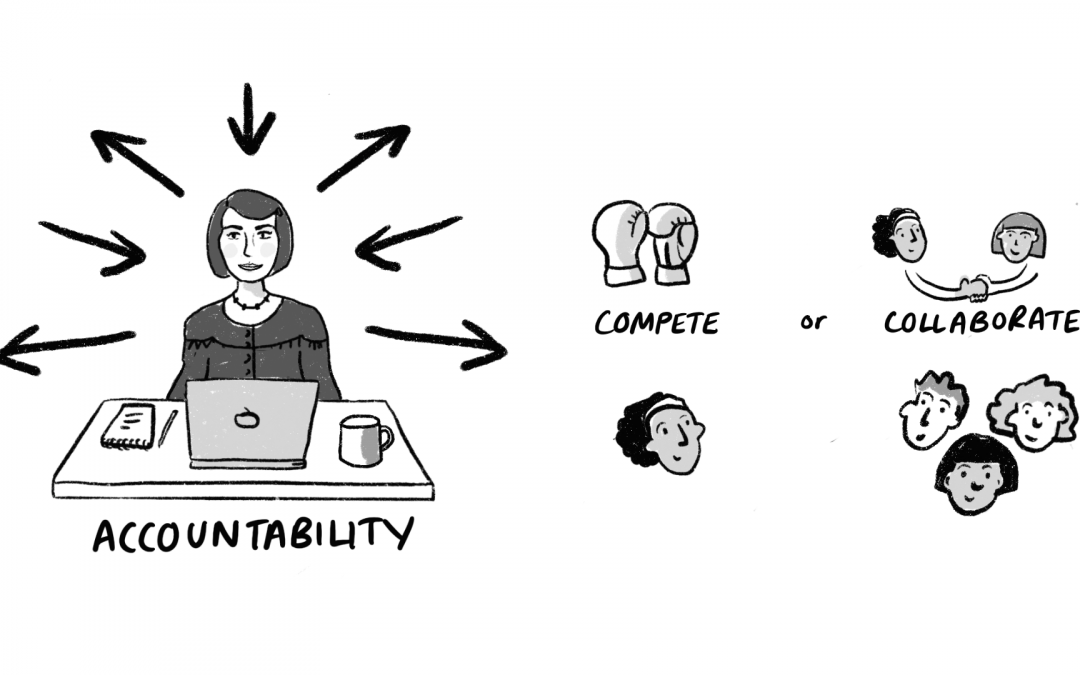Writing accountability comes in all shapes and sizes. Whether you like to keep your projects secret or enlist others to support you, we’ve got you covered in this complete guide to writing accountability. Find out why it matters, get inspired by the ingenious methods other writers use, and find the most effective way to keep accountable to your personal writing goals.
What is writing accountability and why does it matter?
Sometimes a spark lights our creative fire and we’re off like a rocket. We’re motivated to write with a powerful energy. Writing is a pleasure in and of itself. We’re in love with our project.
While this is wonderful, it often fades.
Other times we don’t want to write at all – we have to – for school or work or a project we’re involved in. There’s no internal motivation at all, just a sense of dread that leads to avoidance and delay.
If you’re not feeling the love for your current work in progress you need accountability to keep you going.
Accountability is all about being answerable. Being answerable to someone or something external is a proven method for achieving your goals. Accountability buddies have been working miracles in other areas, for example helping alcoholics keep on the wagon.
Writers being imaginative sorts have some ingenious approaches you can experiment with, but before we get stuck into that, we need to explore the two types of accountability – internal and external.
Internal accountability versus external accountability
Some people seem to have an innate ability to hold themselves to account. They just need to set a New Year’s resolution and they show up and smash it. It might be they were born with a cast iron willpower, have magic on their side, or have developed a system that keeps them motivated while they train for marathons, launch podcasts or learn languages. They are the masters of internal accountability – they dream it then do it.
Other people need extra assistance. They know that setting a goal might get them started but it’s not enough to keep them going – they need to enlist some outside support.
They go public and announce their intentions on Facebook, ask for supporters to cheer them on, persuade friends to join them, or invite guests to a party to celebrate achieving their dreams. The social pressure that comes from external accountability gives a motivational kick to keep on going when things get tough.
Both internal and external accountability rely on some form of obligation, reporting to yourself or to others on your progress, or perhaps to justify why you’ve fallen behind. Let’s find out what approach, or combination of approaches, might work for you.
Gretchen Rubin’s four tendencies
If you’re not sure whether inner or outer accountability will work best for you, here’s an idea from author Gretchen Rubin that might help.
In Better Than Before Rubin shared strategies for habit formation, one of which was her theory of the four tendencies. Based on observation and then backed up with research (her quiz has been taken by over 3 million people) the four tendencies theory was a breakthrough moment for Rubin who had been studying and writing about happiness and habits for years. She felt she had “uncovered a law of nature: human nature” itself.
Rubin started with the observation that people face two kinds of expectation, namely:
- Outer expectation – expectations others place on us such as a work deadline.
- Inner expectation – expectations we place on ourselves, like keeping a New Year’s resolution.
Depending on how a person responds to inner and outer expectations led to an insight that there are four distinct types of people, these are:
- Upholders who respond to both inner and outer expectations.
- Rebels resist both inner and outer expectations.
- Obligers respond to external expectations and struggle to meet internal expectations.
- Questioners questions all expectations, and as such they only respond to internal expectations.

See her diagram above for more detail. Many people can identify which type they are at a glance, but if it’s piqued your interest and you want to find out more take the quiz or buy the book.
Internal accountability: how to hold yourself to account
Once you had an idea for a project, you imagine writing it. This is the first stage of motivation – having a dream. This is also where many of us fail – not being able to turn that dream into a plan of action.
Using internal accountability can transform your desire to write into a rock-solid plan to start and keep going. Check out these tried and tested approaches for holding yourself to account:
1. Start with why
Like Simon Sinek’s famous TED Talk and book – starting with ‘why’ can inspire greatness. Understanding why you are doing something and aligning your actions with your personal values, ambitions and goals is a powerful motivator.
This approach is particularly effective for Rubin’s questioners who need to understand why they are doing something before they commit to it. For example, they will reject an arbitrary deadline, not to be awkward but instead to understand why it’s been set, and whether they want to and are able to meet it. If they agree – there’s no stopping them!
2. Set a goal
Having a clear goal gives you something to aim for – so get clear on what you’re writing. As well as knowing what success looks like, break the goal into small steps and set milestones to monitor progress.
>> Read more: How to set a writing goal: the ultimate guide
3. Meet a challenge
NaNoWriMo attracts hundreds of thousands of writers each year to write a 50,000-word novel in November. It looks like collective madness, but having an ambitious goal can be incredibly effective.
Challenges motivate us to stretch ourselves beyond what we’re capable of. All you need to do is set a target just beyond your comfort zone, so for some it might be the infamous Big Hairy Audacious Goal, for others it might be a simple practice such as maintaining a writing streak for as long as they can.
4. Reward the effort
Rewards are an essential part of building a habit and rightly so, they make doing something difficult (like writing) more enjoyable and more likely to that you’ll continue.
There’s no one size fits all reward – what’s a treat for you is a punishment for someone else. Some writers are intrinsically motivated. They’re not incentivised by an external reward such as fame, wealth and literary prizes; instead the motivation comes from within and the reward is a warm feeling of positive emotion. Others are in it for the chocolate and champagne (the accolades, reviews and prizes help too).
Take time to figure out what reward would motivate you, at what stage of your writing, and build it into your routine. Rewards will help you notice milestones, celebrate progress and keep you going.
5. Punish yourself
While some of us are motivated by the proverbial ‘carrot’ of rewards, others need the ‘stick’ to keep going.
Research shows that people are motivated more by loses than gains – so putting something on the line, such as placing a financial wager, is likely to keep your writing even when you don’t feel like it. That’s the theory behind StickK.com a website set up by behavioural economists at Yale University. They say: “Attaching a financial incentive to your personal goals reinforces your resolve and willpower and increases your likelihood of success.”
In short, you set a goal then make a financial commitment if you fail to meet it. One suggestion is to donate to an organisation you deeply oppose, so if you’re a pacifist who campaigns for gun control you’d choose the National Rifle Association for your donation. It’s a nuclear option, but one that’s likely to keep you writing.
A lesser punishment might be using software that deletes your words if you aren’t typing fast enough – try Write or Die.
External accountability: how other people keep you on track
It can be hard to keep going with your writing when you’re the only one invested in the idea. When no-one knows or cares about your project, or understands your struggles to find the time or get words on the page. It can be lonely, dispiriting and doubt sets in – fatal for your writing progress.
That’s when external accountability can power up your motivation. Having something external to your own dreams and desires can keep you focussed and writing. It means you’re answerable to someone else for your writing progress, though you still get to define what progress looks like. It ramps up the pressure and raises the stakes because you’re now writing for someone other than yourself.
But it’s not all stress – the best sort of accountability provides support, advice, and feedback. For many writers, it’s a sure-fire way to get them writing and keep them going.
Research backs it up: accountability partnerships lead to greater success in achieving goals. Psychologist Dr Gail Matthews from the Dominican University of California found that people who share their goals with a friend and send them weekly updates on progress are on average 33% more successful in accomplishing them.
We are blessed in the writing community to have many examples of how to use other people to up the stakes and keep us accountable to our goals. Find out some of the approaches writers use to power up their writing productivity and make progress.
Top external writing accountability approaches to try
1. Go public
Just tell people! This one’s pretty simple but it’s surprising how many people embark on a writing project in secret. Just telling one other person – and asking them to check in on you regularly – is a great way to keep you moving forward.
2. Sign a writing agreement
Research has shown that having a ‘commitment contract’ makes people significantly more successful if they signed a contract that obliged them to achieve their goals.
Writers sign a ‘contract’, an actual signed agreement between two parties committing the writer to write. You outline the terms of your commitment – say writing four out of seven days a week, for a number of hours, or a certain amount of words or pages. Then you need to deliver on that promise, for example emailing, messaging or tweeting your co-signatory to confirm you’ve done it. It’s a similar relationship to the one many PhD researchers have with their supervisor, but any type of writer can try it.
In addition to enforcing the agreement, the co-signatory will check in with you, offer support and encouragement to keep going. They are there for you, as and when you need them.
3. Critiquing partners
A critiquing partnership is between two writers who share their writing, get feedback and offer guidance and support.
It’s a relationship based on trust. As such, many critiquing partners originally met face to face on a writing course, are introduced by a friend, or have a period getting to know one another.
Both partners should agree how it will work, for example what writing will be exchanged, when, and what sort of feedback they are looking for. It takes time to develop trust, and like all good relationships it’s based on communication.
Start by offering honest, objective and respectful feedback. Other tips on giving useful feedback include being specific and offering examples, acknowledging both strengths and weaknesses, and always critiquing the writing not the writer.
Critiquing partnerships give you a writing buddy for solidarity and support and while also getting valuable feedback on your work.
4. Writing groups
Joining a writing group takes the critiquing partnership up a level. Groups vary in size and can be either online or face-to-face, but the principle is that writers share work and offer feedback. It is a great way to keep writing isolation at bay and learn from other people who might be at the same stage as you or write similar things.
Here’s a few examples you can join or adapt. One of our favourites is London Writer’s Salon which organises Writer’s Hour every weekday at 8am – not just in London but other time zones around the world. NaNoWriMo organises write ins during the month of November and Camps throughout the year.
There’s Shut Up & Write! With over 50,000 writers worldwide this meetup provides accountability and social support. Academic writers follow it with structured writing sessions, often with timed Pomodoro sessions.
One academic writer I know co-ordinates a fake meeting so she and her colleagues can meet in the library to write. With the ‘meeting’ booked into their calendar no-one can steal the time but the twist is that they don’t actually meet – though they go to the library they don’t sit together or speak.
Finally, there are writing groups meeting in-person all over the world – just check your local library, bookshop or search online. Somewhere near you a group of writers are writing.
>> Read more: Thinking of joining a writing group? Ask yourself these 8 questions first
5. Feedback from friends and family
It can be scary sharing your work with strangers so some writers call on friends and family to read and feedback. The relationship is already in place, so you need to make sure they’re clear what they are being asked to do and why.
Ask specific questions, give them deadlines, and tell them how you want them to comment. You know them already, so will be familiar with their personality – some of them will be blunt and tell you straight, whereas others might be so full of praise you don’t get anything constructive to work with. To get a balance, recruit a few people and get a mix of ages, genders, backgrounds and experience. Be wary of bias – you’re more likely to get positive feedback, so use this approach as a stepping stone to approach readers you don’t know.
6. Beta readers for writing accountability
A beta reader is an unpaid test reader of work in progress who gives feedback to the author from the point of view of an average reader.
When I was writing my business book, I used my professional network to get my target audience involved as I wrote. Work out who your audience is, and where you might find them – for example a Facebook group, on LinkedIn, an online community or fan site.
As with all beta readers, be clear what’s involved, what you expect from people and what they get in return – will they get listed in the acknowledgements, a copy of the book, a discount or a warm fuzzy feeling they’ve helped? Ask for specific feedback, listen to it and respond – tell people what you’ve done with their comments.
7. Pay for a course
There’s something about putting your money on the line that doubles your commitment. Paying for a course, whether it’s online or in person ticks lots of boxes for accountability – it involves other people as it’s run by an expert and will have fellow writers, there’s a structure to follow, support and/or feedback, and perhaps a reward for completing a project at the end.
There are thousands of courses available to suit every genre, preference or budget, from your local college or library, to writing development agencies and publishers, online course on the major learning platforms from Udemy to Skillshare all the way up to academic qualifications delivered by universities.
8. Writing coach or mentor
Having a coach or mentor can be expensive but by working with a professional you get tailored advice and expertise to keep you on track.
A good coach will respond to your needs and support you as you write. However, it’s not an easy ride – you must do the work and they will hold you to account if you fail to meet your promise.
How to build a writing accountability system
Your writing is unique and so are the systems you put in place to keep you writing. In the same way that you brainstorm ideas for new projects, you should also imagine all the ways you can hold yourself to account. While one practice might work, having a few in combination could be the way to go.
>> Read more: How to write a book in 100 days
I used a mix of internal and external accountability structures when writing my book. I tracked my writing and gave myself rewards for hitting milestones, I went public and tweeted my progress using #100daysofwriting, I recruited beta readers to feedback and had the mother of all deadlines to submit to my publisher. Together they created a support system that kept me on track.
How to hold yourself to account and achieve your writing goals
- Understand your tendency – take Gretchen Rubin’s four tendencies quiz
- Get creative and brainstorm as many ways as you can to leverage both inner and outer accountability: using other people, tricks, bribes, rewards, punishments.
- Test out different approaches and reflect on what works – and keep doing it!
- Use a combination of approaches, you could enter writing competitions and motivate yourself with rewards for entering rather than waiting for the results.
- Keep experimenting – how you write will change, so keep open to using new approaches.




